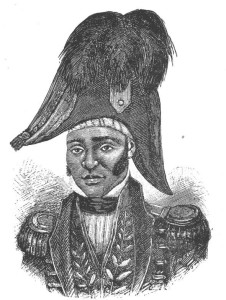The “Black Republic:” The Meaning of Haitian Independence before the Occupation

This is the second entry in a series on the centennial of the U.S. occupation of Haiti. The introduction to this series can be found here.
On January 1, 1804, Jean Jacques Dessalines and his fellow generals met at Gonaïves to declare formally their independence from France. The Haitian Declaration of Independence and the establishment of the first republic governed by men of African descent in the Western Hemisphere stunned whites and blacks in the United States. White planters and their sympathizers denounced Haiti, inventing the phrase “the horrors of Saint-Domingue” to describe the violent process by which an enslaved people had risen up, overthrown their masters, and fulfilled the worst fears of a slaveholding nation.[1] African Americans, however, articulated a much different interpretation of the Haitian Revolution. For some, the act of self-emancipation in Haiti stirred their own hopes for freedom. For others, the creation of a “Black Republic” was a radical assertion of racial equality, an unprecedented opportunity for blacks in the Western Hemisphere to demonstrate their ability to prosper as citizens and leaders of a modern nation. For many, then, Haiti had a special mission—a mission endorsed by its own political leaders—to the entire world.
Enslaved blacks in the antebellum South were quick to embrace Haiti as an emblem of black freedom. In his biography of Frederick Douglass, Booker T. Washington noted that enslaved men and women knew “of the Haytian struggle for liberty” even if they were ignorant of everything except [their] master and the plantation.”[2] This was certainly true in the region of Douglass’s birth. One bishop of the African Methodist Episcopal Church born on Maryland’s Eastern Shore in 1821 recalled “old people speaking about persons going to Hayti” during his childhood. In particular, he remembered hearing a song about an enslaved youth who, “on account of bad treatment,” fled to Philadelphia before boarding a ship bound for Haiti. It went:
Poor Moses, poor Moses,
Sailing on the ocean.
Bless the Lord,
I am on the way,
Farewell to Georgia.
Moses is gone to Hayti.[3]
Moses, like some thirteen thousand other African Americans in the antebellum era, chose to leave the United States for Haiti. The United States was all slavery and “ill-treatment.” Haiti was freedom.
Free blacks in Philadelphia and other northern cities were no less enamored with Haiti. While some promoted emigration to that country, a greater number urged the United States to extend diplomatic recognition to it. In 1849, escaped slave and New York-based abolitionist Samuel Ringgold Ward lambasted white politicians who “refuse to acknowledge the independence of a Republic, the majority of whose citizens are black men, lest such an acknowledgement should offend negro haters in Washington.”[4] In Ward’s estimation, Haiti was not only a site where blacks could experience unparalleled freedom. Instead, it was a country that could prove wrong those who claimed that African Americans were unfit for citizenship because they could not claim a “legitimate” external nationality.[5] Consequently, Ward demanded that the United States finally acknowledge the sovereignty of a “Republic half a century old . . . that has done more to prove its capacity for self-government . . . than the United States.”[6]
The ideas about Haiti expressed by African Americans corresponded to the self-image held by Haitian elites. Believing that a mass influx of industrious African Americans would strengthen the economy of Haiti and help it win diplomatic recognition from the United States, Haitian President Jean-Pierre Boyer, a veteran of the Haitian Revolution, promoted emigration in U.S. newspapers. In doing so, he assured African Americans that Haiti’s “wise constitution . . . insures a free country to Africans and their descendants.” Moreover, he guaranteed that “Providence has destined Hayti for a land of promise, a sacred asylum, where our unfortunate brethren will, in the end, see their wound healed by the balm of equality, and their tears wiped away by the protecting hand of liberty.”[7] Such bold claims emboldened African Americans, leading individuals like Moses to equate Haiti with black freedom and others including Ward to link Haiti to elusive rights of citizenship.
They also set Haitians and African Americans up for disappointment. By romanticizing Haiti, elite Haitians and their African American counterparts recognized an indisputable fact: a nation birthed in slave insurrection and governed by black people would always possess a unique standing in global affairs. But they also placed an unfair set of expectations upon Haiti and those citizens who would bear the burden of ensuring that their country existed not only in reality but also in symbol; that it would embody everything an idealized “Black Republic” could and should be. Given the political and cultural confines of the nineteenth-century West, such lofty expectations would prove hard (perhaps even impossible) to meet.
Next month: “Ask Forgiveness from Dessalines:” Debating Haitian Independence on the Eve of Occupation
[1] White Americans, particularly white southerners’, reaction to the Haitian Revolution receives a more extended treatment in Alfred Hunt, Haiti’s Influence on Antebellum America: Slumbering Volcano in the Caribbean (Baton Rouge: Louisiana State University Press, 1988), 107-147.
[2] Booker T. Washington, Frederick Douglass (Philadelphia: G.W. Jacobs & Company, 1907), 144.
[3] Alexander Walker Wayman, My Recollections of African M.E. Ministers, or Forty Years’ Experience in the African Methodist Episcopal Church (Philadelphia: A.M.E. Book Rooms, 1881), 4.
[4] Impartial Citizen, August 15, 1849.
[5] My fellow AAIHS blogger, Patrick Rael, has, of course, captured these nationalist sentiments in his Black Identity and Black Protest in the Antebellum North (Chapel Hill: The University of North Carolina Press, 2002).
[6] Impartial Citizen, August 15, 1849.
[7] Niles’ Weekly Register, July 1, 1820. For further reading on the African American emigration movement to Haiti, I recommend Sara Fanning, Caribbean Crossing: African Americans and the Haitian Emigration Movement (New York: New York University Press, 2015).
Copyright © AAIHS. May not be reprinted without permission.